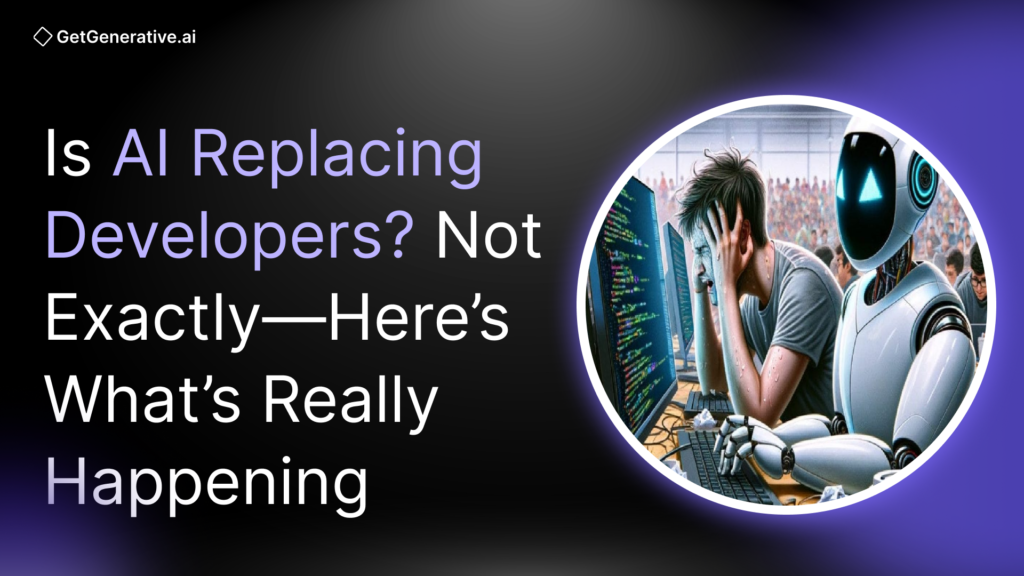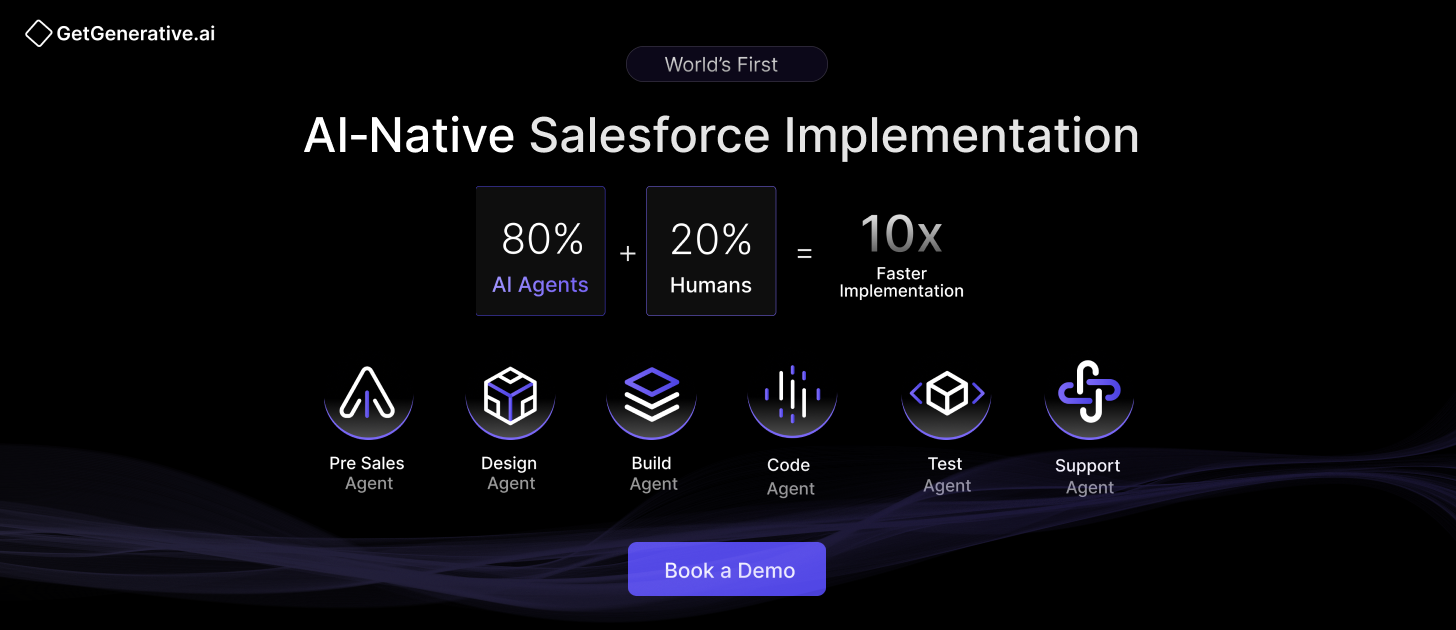Is AI Replacing Developers? Not Exactly—Here’s What’s Really Happening
The belief that AI will soon replace software developers has spread rapidly, stoked by bold predictions from tech leaders and sensational headlines.
Meta CEO Mark Zuckerberg claimed AI could handle “half of the company’s software development within the next year”, while Google’s Sundar Pichai and Microsoft’s Satya Nadella each stated that 30% or more of their code is now written by AI. These declarations have triggered a wave of anxiety across the developer community.
But a closer look at recent data, industry reports, and developer surveys suggests a more nuanced truth: AI is not replacing developers. It’s reshaping the development process — improving productivity, attracting new talent, and altering team dynamics.
The future belongs not to machines alone but to developers who adapt and collaborate with AI.
The Hype vs. the Reality
Tech Executives Fuel the Narrative
Headlines citing AI’s dominance often stem from optimistic projections by tech leaders. In 2025 alone:
- Meta’s Mark Zuckerberg suggested AI would write up to 50% of code.
- Microsoft CTO Kevin Scott predicted AI would write 95% of all code within five years.
- Anthropic CEO Dario Amodei stated AI could soon be “writing essentially all code”.
These statements, while headline-grabbing, often focus on theoretical potential under ideal conditions. They emphasize what AI could do, rather than what it’s doing today in real-world developer workflows.
Developer Sentiment Tells a Different Story
In contrast to C-suite projections, developer surveys reflect optimism, not fear:
- According to the 2024 Stack Overflow Developer Survey, 70% of professional developers do not see AI as a threat.
- 62% reported using AI tools in 2024, up from 44% in 2023.
- 76% said they are currently using or planning to use AI assistants.
Developers aren’t just tolerating AI — they’re welcoming it as a tool to automate tedious tasks, accelerate prototyping, and free up time for creative and complex work.
Enterprise Usage Patterns Show Rapid Adoption
The GitHub 2024 AI Survey, conducted with over 2,000 enterprise developers from the U.S., India, Brazil, and Germany, reported:
- 97%+ have used AI coding tools in the workplace.
- In the U.S., 88% of developers said their company encourages or permits AI tool usage.
- GitHub’s conclusion? “AI doesn’t replace human jobs — it frees up time for human creativity.”
Together, these insights indicate a strong bottom-up adoption trend, where developers use AI tools regardless of whether corporate policy has formally caught up.
How Developers Are Using AI Today
AI as a Coding Assistant
The most common use case for AI in development today is code generation. In the Stack Overflow 2024 survey:
- Eighty-two percent of developers using AI assistants report using them for writing code.
- 27% currently use AI for code testing, with many planning to expand their usage.
AI excels at writing boilerplate, filling in syntax, and providing scaffolding. As one developer noted,
“AI is like an eager junior developer — fast, but still needs supervision.”
Projected Deeper Integration Across Workflows
Expectations for 2025 and beyond suggest even deeper AI integration:
- 81% of developers believe AI will become a core tool for code documentation.
- 80% expect more AI assistance in testing.
- 76% foresee broader AI usage in code generation.
This indicates developers see AI as a supportive co-pilot, not a replacement, enhancing work across the software development lifecycle.
Reported Productivity Benefits
GitHub’s 2024 data underscores clear wins from AI adoption:
- Developers using AI reported increased productivity and more time for collaboration and architecture.
- Commonly cited benefits included:
- Better code quality
- Faster test case generation
- Easier language learning and onboarding
In short, AI reduces friction and unlocks strategic capacity, especially for teams under time pressure.
Caveats: Security, Accuracy, and Overreliance
Despite the benefits, AI tools aren’t flawless:
- A Stanford study (2022) found that developers using AI assistants were more likely to write insecure code.
- The issue isn’t necessarily incorrect syntax — it’s that AI suggestions are often subtly wrong or insecure in ways beginners may miss.
Google engineer Addy Osmani coined the “70% problem”: AI helps with repetitive tasks but fails at nuanced, complex problem-solving, areas where human expertise is critical.
This underscores the need for a “review-before-use” mindset. Developers must treat AI outputs as drafts, not final code, and organizations should reinforce human-in-the-loop coding policies.
AI and Developer Productivity: By the Numbers
Hard Data from the Field
One of the largest controlled studies on AI coding assistance comes from GitHub:
- Involving ~4,800 developers across Microsoft, Accenture, and a Fortune 100 firm.
- Developers using GitHub Copilot:
- Completed 26% more pull requests
- Made 13.5% more code commits
- Had 38.4% more code compilations
Crucially, no drop in code quality was observed.
Another independent review reported that Copilot users delivered code 12.6% faster than non-users. These aren’t isolated anecdotes — they’re evidence-based gains at enterprise scale.
Skill Amplification, Not Equalization
AI doesn’t flatten the playing field — it amplifies existing skills:
- Senior engineers saw up to 22% faster coding speeds with Copilot.
- Junior engineers saw only 4% improvement.
This reinforces the importance of developer experience and prompt engineering skills. Those who know how to frame queries and review AI output effectively will gain the most.
How AI Is Changing the Role of Developers — Not Replacing Them
From Code Monkey to Creative Engineer
AI is increasingly seen as a force multiplier, allowing developers to offload mechanical tasks and shift focus to higher-level work:
- Code design
- System architecture
- Cross-functional planning
- Stakeholder alignment
In this context, developers evolve from “doers” to “architects and problem-solvers.” As generative AI handles more of the “how,” developers focus on the “why” and “what.”
💬 “AI makes everyone operate at a higher level — but you still need humans to lead,” said Dror Weiss, CEO of Tabnine.
Real-World Developer Skills That Still Matter
Despite automation, core competencies remain indispensable:
Critical Skill | Why It Still Matters |
System architecture | AI can’t define cross-platform logic or performance trade-offs |
Algorithm design | Performance optimization and scalability still require human input |
Security best practices | AI often fails to catch subtle vulnerabilities |
Business logic understanding | Translating messy requirements into clean solutions |
Communication & teamwork | AI can’t replace stakeholder management or collaborative decisions |
These are the areas where humans outshine machines, and where career growth will be anchored in the years ahead.
Developer Job Market: The Forecast Is Bright
Strong Employment Outlook
Contrary to fears of a shrinking talent pool, official projections remain bullish on the future of software development:
- U.S. Bureau of Labor Statistics (BLS) projects:
- 17.9% job growth for software developers from 2023 to 2033
- Compared to the 4.0% average for all occupations
These figures indicate that while some tasks will be automated, new roles and opportunities are emerging just as fast, particularly in AI operations, integration, data infrastructure, and security.
GitHub’s Octoverse 2024: Global Developer Boom
- 518 million repositories created (25% YoY growth)
- ~1 billion open-source contributions
- 98% growth in generative AI-related projects
GitHub’s report shows an exploding developer ecosystem, not a shrinking one, especially in regions like India, Brazil, Nigeria, and Indonesia, where developers are increasingly learning via AI tools.
📈 “AI isn’t just helping people write code. It’s helping more people become developers.
This trend lowers the barrier to entry, democratizing development for global learners.
Special Cases: When AI Replaces Roles
To be clear, there are outliers:
- Salesforce CEO Marc Benioff announced the company wouldn’t hire new engineers in 2025 due to a 30% productivity boost from AI.
- A handful of startups and agencies have replaced QA and documentation staff with generative AI systems.
- However, most of these cases are tied to cost-cutting or restructuring in response to economic pressures, not AI capability alone.
Moreover, these examples are exceptions, not signals of an industry-wide trend.
Also Read – Vibe Coding in Salesforce: What It Is and Why It’s the Future
Strategic Guidance for Developers and CTOs
1. Embrace AI Early — but Thoughtfully
Adopt AI tools like:
- GitHub Copilot
- Amazon CodeWhisperer
- Replit Ghostwriter
- Cursor, Codeium, or GetGenerative.ai for advanced use cases
Roll them out via internal workshops, code labs, or hackathons. Monitor usage with defined KPIs, and ensure best practices (security, licensing, accuracy) are followed.
2. Invest in Modern Skills
Encourage learning paths in:
- Python, TypeScript, and Jupyter Notebooks
- ML frameworks (PyTorch, TensorFlow)
- Prompt engineering and model evaluation
- Cloud-based AI tools (Azure ML, AWS SageMaker, Vertex AI)
Developers proficient in these areas will become increasingly valuable.
3. Balance Automation with Fundamentals
While AI can scaffold functions and write tests, engineers must still know:
- How to debug, refactor, and optimize manually
- How to conduct code reviews
- How to design scalable and secure architecture
Ensure junior devs aren’t overly reliant on AI. Pair them with mentors and use AI-assisted outputs as teaching moments, not final deliverables.
4. Elevate the Developer Role
Prioritize team capacity in:
- Solution design
- Strategic decision-making
- Cross-functional collaboration
- AI implementation strategy
As the “grunt work” fades, developers should own more innovation and leadership responsibilities.
5. Govern Responsibly
Put in place:
- Static analysis and security testing pipelines for AI-generated code
- Code linting and IP checks
- Clear guidelines on code review and manual overrides
Make it clear: developers remain accountable, even when using AI outputs.
6. Evolve Roles and Org Structure
Emerging positions to consider:
Role | Purpose |
Prompt Engineer | Optimize LLM inputs for better code generation |
AI QA Specialist | Review AI-generated outputs for bugs or logic flaws |
AI DevOps Lead | Manage automated pipelines integrating AI services |
AI Ethics Advisor | Ensure compliance, fairness, and transparency |
Upskilling current staff into these roles builds internal capability and reduces reliance on outside consultants.
Related Read – A Comprehensive Guide to Vibe Coding Tools
Final Thoughts
Rather than asking “Is AI replacing developers?”, the better question is:
“How can AI help developers become more effective, creative, and indispensable?”
The data is conclusive: AI augments developers. It enhances speed, encourages new entrants into tech, and shifts developer time toward solving higher-order challenges.
The future won’t be code written by AI alone — but rather, code written with AI, by developers who know how to guide it.




